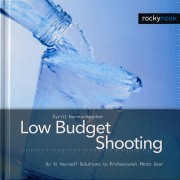
| Home |
| Join/Renew Online! |
| About NCMUG |
| Membership |
| Newsletter |
| Special Interest Groups |
| Mail Lists |
| Volunteering |
| Book Library |
| Member Sites |
| NCMUG FAQs |
| Mac FAQs |
| Contact Us |
| Site Map |

 Low Budget Shooting - Do It Yourself Solutions to Professional Photo Gear
Low Budget Shooting - Do It Yourself Solutions to Professional Photo Gear
Low Budget Shooting - Do It Yourself Solutions to Professional Photo Gear
Publisher: Rocky Nook
Retail Price: $19.95
If you are a serious amateur photographer, you have already invested a small fortune in a great digital camera, a flash or two, lenses, and software. Now you want to accomplish tabletop photography of objects or products with a goal of professional results. Normally, this requires additional investment in equipment such as light tents, light boxes, reflectors, strip lights, diffusers, soft-boxes, traveling collapsible scrims, and backgrounds to make the photos have that look that "pops."
Well, hold on to your wallet. To quote the back cover of this hard cover book, "Low Budget Shooting is the one-stop source where you will learn how to build an array of useful, yet inexpensive photographic tools." The book shows you how to make perfect "photographer's little helpers" that result in stunning photography.
Cyrill Harnischmacher is a German photographer and designer. His book is not only chock-full of inexpensive solutions, but is a handsome publication with crisp photos of the assembly suggested to make your own equipment. Each chapter explores a piece of gear with simple instructions for construction. Each chapter also has a list of Materials, Tools, and Sources for Materials.
For example, the Mini-seamless backdrop, a really useful shooting environment, can be made from fiberglass rods, rubber tubing, presentation cardboard, and black velour paper with tools as simple as an utility knife, scissors, hole punch, and small saw. Not only is the design of the gear sleek and utilitarian, but the German engineering standard is evident in the "clean" photographic illustrations the author provides. The photos show the materials laid out, details of construction, the completed item, and a sample photo still life taken with the item in play.
I have experience photographing a variety of tabletop situations - from artistic sculptures made from organic gourds to hundreds of antiques varying in size from a finger ring up to huge Chinese lacquer chests. Along the way I had to purchase the expensive equipment needed to soften the light and reduce glare, among other requirements. Had I seen this book at the time, I could have saved hundreds of dollars and had more successful gear for the photography I wanted to achieve.
The author suggests that the book can be an inspiration to develop your own gear. You can modify the size and shape of an item to suit your own needs. "Tabletop photography often requires a talent for improvisation and unconventional solutions. Aside from the financial aspects, your study of lighting techniques is significantly more meaningful when using homemade gear than when using ready-made equipment, and you tend to move through the learning curve faster."
I would recommend another book, "Photographing Arts, Crafts & Collectables," Lark Photography Books, to delve into the actual photographic technical techniques of tabletop photography. However, for building essential equipment for use in the studio and out in the field, "Low Budget Shooting" is the ultimate authority.
Review by NCMUG member John Hershey